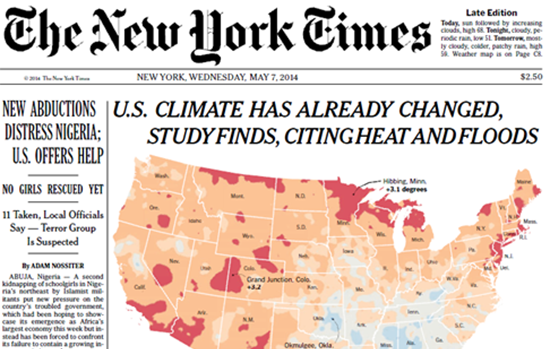
This research aims to clarify why there is such a difference between expert understandings of the environmental risk of global warming and climate change, and social world understandings. The news media are the primary source of information about science for the non-expert social world. Therefore this analysis compared expert priorities and preferences with news media selections from the Intergovernmental Panel on Climate Change reports. Experts are focused on the physical world; the news media are focused on their audiences. News texts are crafted to appeal to assumed contemporary audience discourses. The comparison of expert and news media reports of an environmental risk aimed to discern in news media texts underlying assumptions about discourses circulating in the social world. The analysis focuses on two ‘best possible case’ information sources: the IPCC reports and the ‘prestige press’ US newspaper The New York Times. Qualitative comparison of IPCC reports and news mediations of those reports is accompanied by quantitative analysis of news information selection frequencies and section placements. Readers of different sections received quite different information about the risks. New York Times journalists preferred political definitions of global warming and climate change over the definitions of scientific experts. The politically-motivated ‘sceptical’ lobby exploited the news ethic of balance and the value assigned to conflict to gain equal or greater news media attention, compared with that accorded to the vast majority of climate scientists. Experts ignored the news media, preferring to advise policy makers. Policy makers obtained most of their information about global warming and climate change from the news or directly from politically well-connected ‘sceptical’ lobbyists. As a result, New York Times audiences received a very partial representation of a risk which was framed as ‘political but not physical’ and ‘global but not local’. Throughout the 17-year analytical period, news selectors virtually ignored expert advice about likely risks to US populations, environments, infrastructures and economies, and expert warnings of the urgent need for adaptation and emergency planning. The research argues, then, that a journalistic focus on political discourses resulted in an overall neglect of information detailing the reasons why experts were certain that global warming would happen and would change climate and sea level , or about physical risks directly threatening New York Times audiences. Audiences consequently did not receive available information about ways of protecting their health, safety and economic security.
Sinclair, Jan (2013). Entertaining facts : what the news media do with expert information about environmental risks. Unpublished doctoral thesis at the University of Auckland. Thesis available at: https://researchspace.auckland.ac.nz/handle/2292/20346


